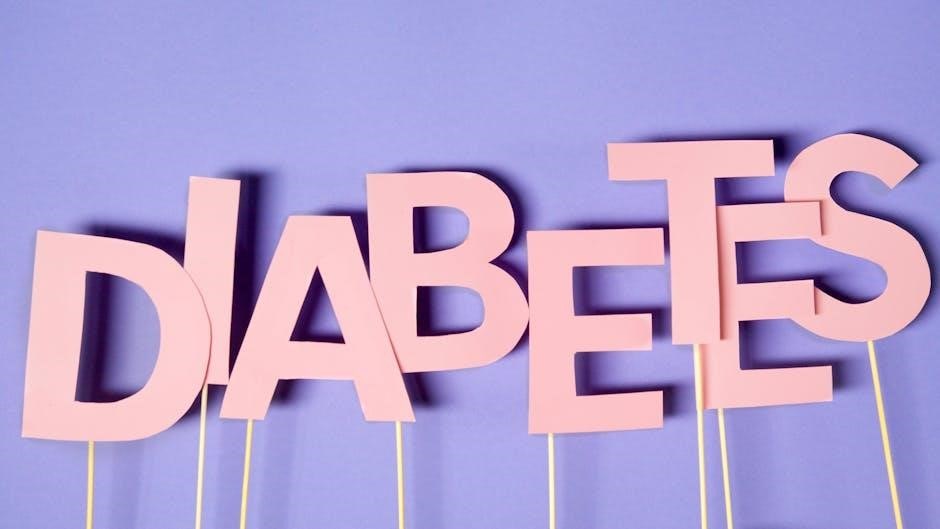The blood type B negative diet is a personalized eating plan,
requiring
specific food choices to maintain health and wellbeing naturally always․
Overview of the Diet
The blood type B negative diet is based on the idea that certain foods are beneficial or harmful to individuals with this blood type․ The diet plan is designed to promote overall health and wellbeing by providing a list of recommended foods and foods to avoid․ According to the diet, individuals with blood type B negative should focus on consuming a variety of foods including lean meats, dairy products, and certain fruits and vegetables․ The diet also recommends avoiding certain foods such as wheat, peanuts, and corn, which are believed to cause weight gain and other health problems․ By following the blood type B negative diet, individuals can potentially improve their overall health and reduce their risk of chronic diseases․ The diet is not just about weight loss, but also about maintaining a healthy and balanced lifestyle․ A well-planned diet can help individuals with blood type B negative to achieve their health goals and improve their quality of life․ The diet plan is personalized and takes into account the individual’s specific needs and requirements․

Recommended Foods for Blood Type B Negative
Lean meats, dairy products, and certain fruits are recommended for blood type B negative individuals always naturally․
Animal-Based Products
Animal-based products play a significant role in the blood type B negative diet, providing essential nutrients and protein․ The diet recommends lean meats such as lamb, goat, and venison, which are rich in protein and low in fat․ These meats are believed to be beneficial for individuals with blood type B negative, as they help to support a strong immune system and a well-functioning metabolism․ In addition to lean meats, dairy products such as milk, cheese, and yogurt are also recommended, as they provide calcium and other essential nutrients․ Eggs are another animal-based product that is encouraged, as they are a good source of protein and can be easily incorporated into meals․ It is also suggested that individuals with blood type B negative consume certain types of seafood, such as cod and salmon, which are rich in omega-3 fatty acids and can help to support heart health․ Overall, animal-based products are an important part of the blood type B negative diet, and can help to support overall health and wellbeing․ A balanced diet that includes a variety of animal-based products can help to ensure that individuals with blood type B negative are getting the nutrients they need․
Fruits and Vegetables
Fruits and vegetables are essential components of the blood type B negative diet, providing vital nutrients and antioxidants․ The diet recommends a variety of fruits, including apples, bananas, and grapes, which are rich in fiber, vitamins, and minerals․ Green leafy vegetables, such as spinach, kale, and collard greens, are also encouraged, as they are rich in iron and other essential nutrients․ Other recommended vegetables include broccoli, cauliflower, and carrots, which are high in fiber and antioxidants․ It is also suggested that individuals with blood type B negative consume certain types of berries, such as blueberries and strawberries, which are rich in antioxidants and can help to support heart health․ A balanced diet that includes a variety of fruits and vegetables can help to ensure that individuals with blood type B negative are getting the nutrients they need to maintain optimal health․ The diet emphasizes the importance of eating a rainbow of colors to ensure a broad range of nutrients․ Fresh and frozen options are recommended, and it is advised to choose organic produce when possible to minimize exposure to pesticides and other chemicals․

Foods to Avoid for Blood Type B Negative
Avoiding certain foods, such as wheat and peanuts, is crucial for optimal health and wellbeing always naturally․
Grains and Legumes
Individuals with blood type B negative should be cautious when consuming grains and legumes, as some can cause adverse reactions․ Wheat, for example, is a grain that should be avoided, as it can cause inflammation and digestive issues․ Other grains like corn and buckwheat should also be limited or avoided․ Legumes such as lentils and peanuts are also not recommended, as they can cause weight gain and other health problems; It is essential to note that not all grains and legumes are harmful, and some can be beneficial in moderation․ Rice, for instance, is a grain that can be consumed in moderation, while beans like green beans and peas are acceptable legumes․ A balanced diet that takes into account individual nutritional needs and health goals is crucial for overall wellbeing․ By being mindful of the grains and legumes consumed, individuals with blood type B negative can maintain optimal health and reduce the risk of chronic diseases․ A personalized eating plan can help guide food choices and ensure a healthy and balanced diet․ Certain grains and legumes should be avoided to achieve optimal health․
Specific Foods to Avoid
Certain foods can be detrimental to individuals with blood type B negative, and it is essential to avoid them to maintain optimal health․ Tomatoes, for example, contain a lectin that can cause inflammation and digestive issues․ Sesame seeds and peanuts are also problematic, as they can cause weight gain and other health problems․ Corn and buckwheat are other foods that should be avoided, as they can cause an adverse reaction․ Additionally, foods like chicken and pork should be limited or avoided, as they can cause an imbalance in the digestive system․ It is crucial to note that each individual is unique, and what works for one person may not work for another․ By avoiding specific foods, individuals with blood type B negative can reduce the risk of chronic diseases and maintain a healthy and balanced diet․ A personalized eating plan can help guide food choices and ensure that the right foods are being consumed․ Certain foods should be avoided to achieve optimal health and wellbeing, and it is essential to be mindful of food choices․ A healthy diet is crucial for maintaining overall health and reducing the risk of disease․

7-Day Meal Plan for B Negative Blood Group
A weekly meal plan provides a
structured
approach to healthy eating always naturally․
Sample Meal Plan
A sample meal plan for blood type B negative individuals includes a variety of foods such as lean meats, fish, and dairy products․ The plan typically consists of three main meals and two snacks per day․
For breakfast, options might include scrambled eggs with spinach, or oatmeal with fruit and nuts․
Lunch and dinner ideas could be grilled chicken or fish with roasted vegetables, or lentil soup with whole grain bread․
Snacks might include fresh fruit, carrot sticks with hummus, or a handful of trail mix made with nuts and dried fruit․
The key is to focus on whole, unprocessed foods as much as possible, and to avoid foods that are known to be problematic for blood type B negative individuals, such as wheat, corn, and peanuts․
By following a sample meal plan and making healthy food choices, individuals with blood type B negative can help to support their overall health and wellbeing․
A sample meal plan can be a helpful tool for planning and preparing healthy meals, and can help to ensure that all nutritional needs are being met․
It is also important to stay hydrated by drinking plenty of water throughout the day․

Diet Chart for B Negative Blood Group
A diet chart helps plan meals, ensuring a balanced diet with allowed foods for B negative blood group individuals naturally always using tables and lists effectively․
Benefits of the Diet
The benefits of the blood type B negative diet are numerous, including improved overall health and wellbeing, increased energy levels, and a reduced risk of certain diseases․ By following a personalized eating plan, individuals with B negative blood type can experience weight loss, improved digestion, and a stronger immune system․ A well-planned diet can also help to reduce inflammation, improve mental clarity, and increase overall physical performance․ Additionally, the diet can help to reduce the risk of chronic diseases, such as heart disease, diabetes, and certain types of cancer․ The diet’s focus on whole, unprocessed foods can also lead to a reduction in unhealthy cravings and a greater sense of satiety, making it easier to maintain a healthy weight․ Overall, the blood type B negative diet offers a holistic approach to health and wellbeing, taking into account an individual’s unique genetic profile to provide a tailored nutrition plan․ This approach can lead to a range of benefits, from improved physical health to enhanced mental and emotional wellbeing, and can be a valuable tool for individuals seeking to optimize their health․ The diet’s benefits can be seen in various aspects of life․
